Classical Ethical Theories in Cybersecurity
VerifiedAdded on 2020/02/19
|9
|1930
|38
Essay
AI Summary
This essay analyzes the ethical dilemmas in cybersecurity, focusing on the balance between security and privacy through classical ethical theories such as utilitarianism, deontology, virtue ethics, and contract theory. It discusses the implications of cybercrime and the responsibilities of various stakeholders in the digital environment, emphasizing the need for cultural change and better cybersecurity laws.
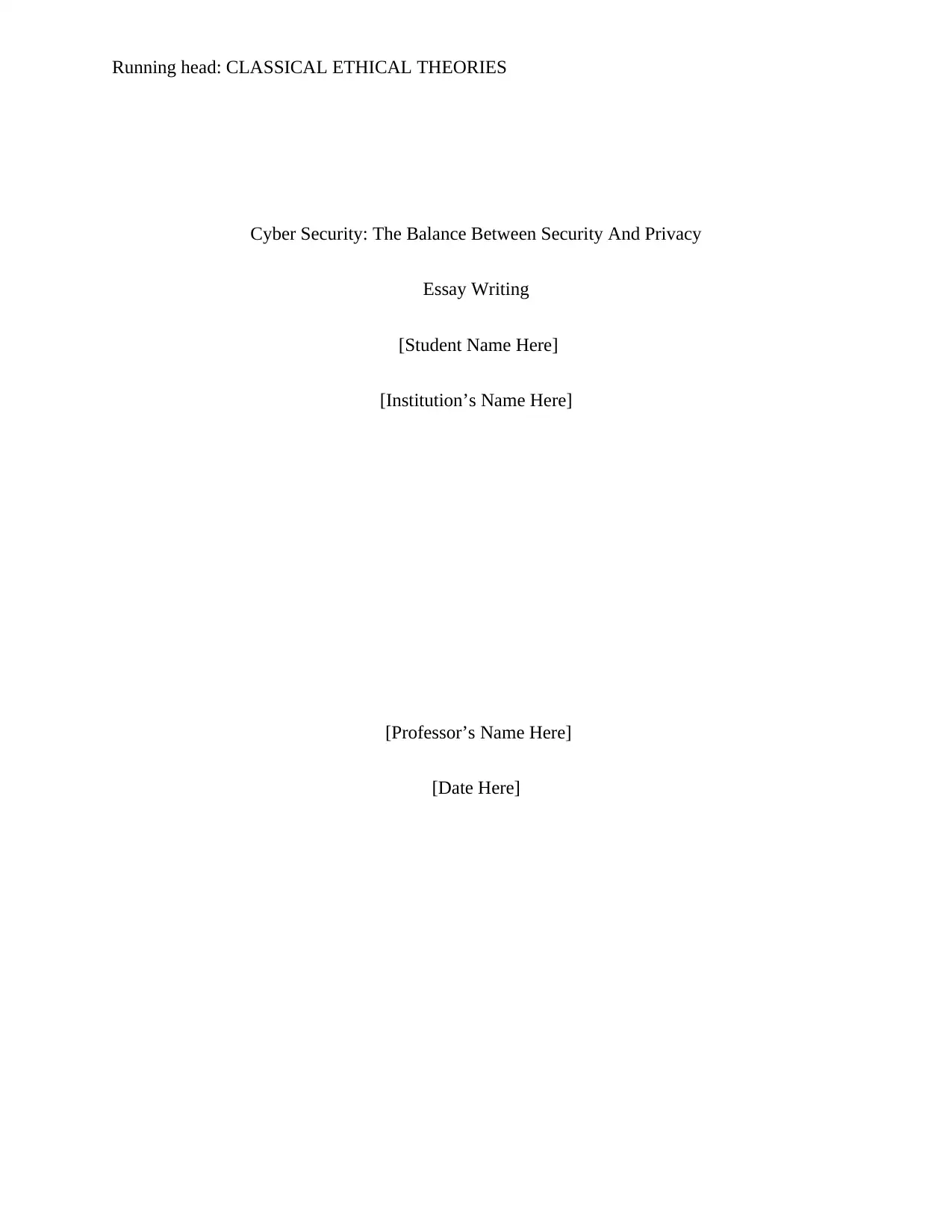
Running head: CLASSICAL ETHICAL THEORIES
Cyber Security: The Balance Between Security And Privacy
Essay Writing
[Student Name Here]
[Institution’s Name Here]
[Professor’s Name Here]
[Date Here]
Cyber Security: The Balance Between Security And Privacy
Essay Writing
[Student Name Here]
[Institution’s Name Here]
[Professor’s Name Here]
[Date Here]
Paraphrase This Document
Need a fresh take? Get an instant paraphrase of this document with our AI Paraphraser
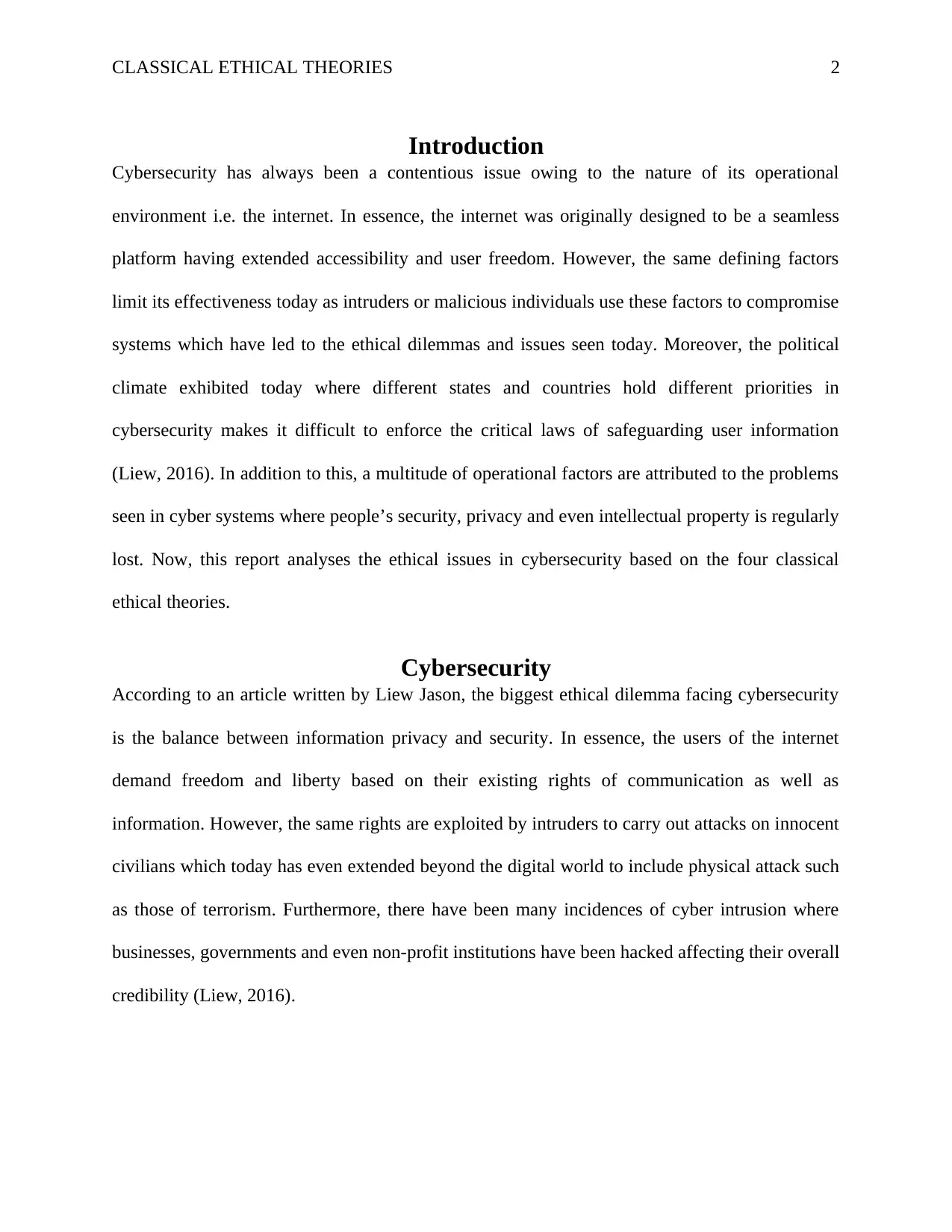
CLASSICAL ETHICAL THEORIES 2
Introduction
Cybersecurity has always been a contentious issue owing to the nature of its operational
environment i.e. the internet. In essence, the internet was originally designed to be a seamless
platform having extended accessibility and user freedom. However, the same defining factors
limit its effectiveness today as intruders or malicious individuals use these factors to compromise
systems which have led to the ethical dilemmas and issues seen today. Moreover, the political
climate exhibited today where different states and countries hold different priorities in
cybersecurity makes it difficult to enforce the critical laws of safeguarding user information
(Liew, 2016). In addition to this, a multitude of operational factors are attributed to the problems
seen in cyber systems where people’s security, privacy and even intellectual property is regularly
lost. Now, this report analyses the ethical issues in cybersecurity based on the four classical
ethical theories.
Cybersecurity
According to an article written by Liew Jason, the biggest ethical dilemma facing cybersecurity
is the balance between information privacy and security. In essence, the users of the internet
demand freedom and liberty based on their existing rights of communication as well as
information. However, the same rights are exploited by intruders to carry out attacks on innocent
civilians which today has even extended beyond the digital world to include physical attack such
as those of terrorism. Furthermore, there have been many incidences of cyber intrusion where
businesses, governments and even non-profit institutions have been hacked affecting their overall
credibility (Liew, 2016).
Introduction
Cybersecurity has always been a contentious issue owing to the nature of its operational
environment i.e. the internet. In essence, the internet was originally designed to be a seamless
platform having extended accessibility and user freedom. However, the same defining factors
limit its effectiveness today as intruders or malicious individuals use these factors to compromise
systems which have led to the ethical dilemmas and issues seen today. Moreover, the political
climate exhibited today where different states and countries hold different priorities in
cybersecurity makes it difficult to enforce the critical laws of safeguarding user information
(Liew, 2016). In addition to this, a multitude of operational factors are attributed to the problems
seen in cyber systems where people’s security, privacy and even intellectual property is regularly
lost. Now, this report analyses the ethical issues in cybersecurity based on the four classical
ethical theories.
Cybersecurity
According to an article written by Liew Jason, the biggest ethical dilemma facing cybersecurity
is the balance between information privacy and security. In essence, the users of the internet
demand freedom and liberty based on their existing rights of communication as well as
information. However, the same rights are exploited by intruders to carry out attacks on innocent
civilians which today has even extended beyond the digital world to include physical attack such
as those of terrorism. Furthermore, there have been many incidences of cyber intrusion where
businesses, governments and even non-profit institutions have been hacked affecting their overall
credibility (Liew, 2016).
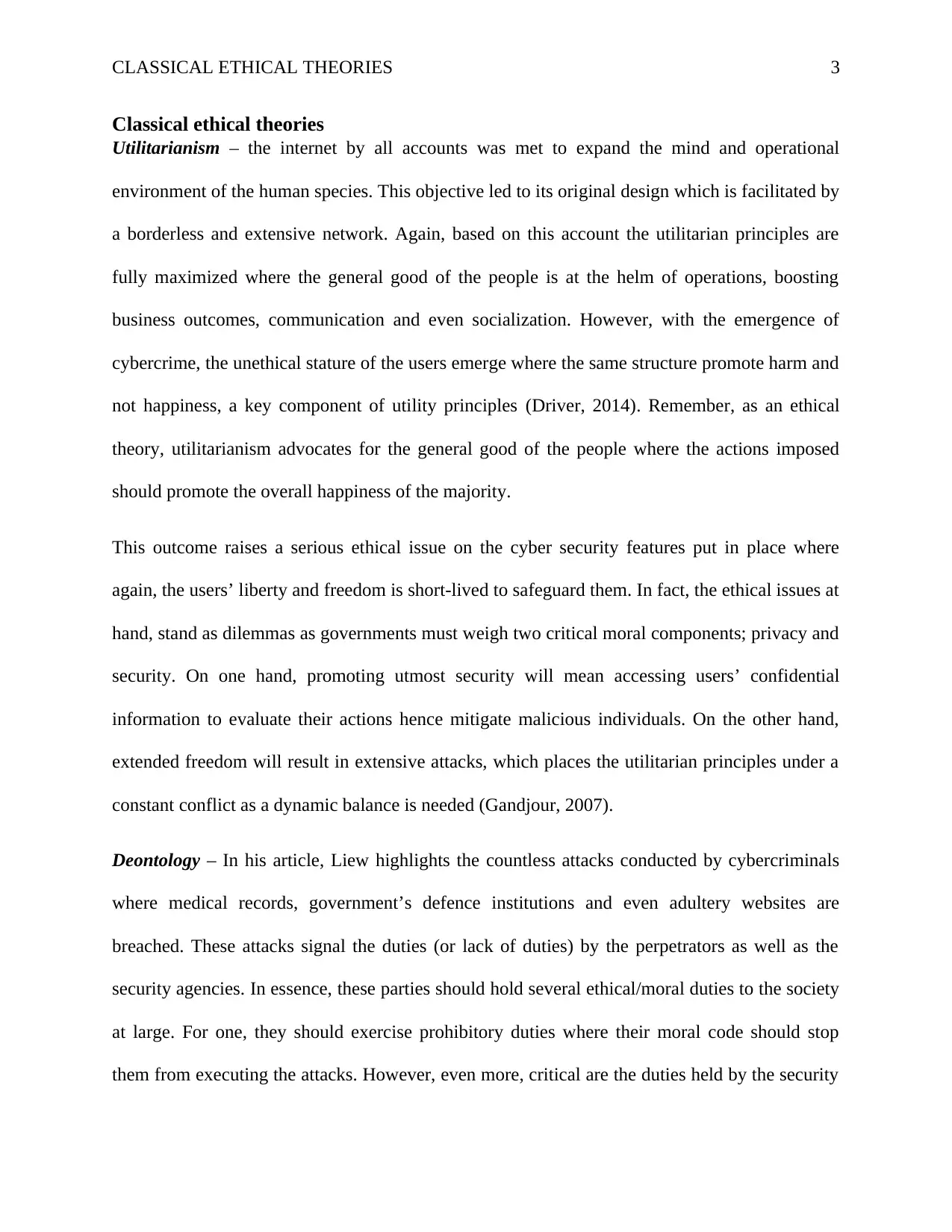
CLASSICAL ETHICAL THEORIES 3
Classical ethical theories
Utilitarianism – the internet by all accounts was met to expand the mind and operational
environment of the human species. This objective led to its original design which is facilitated by
a borderless and extensive network. Again, based on this account the utilitarian principles are
fully maximized where the general good of the people is at the helm of operations, boosting
business outcomes, communication and even socialization. However, with the emergence of
cybercrime, the unethical stature of the users emerge where the same structure promote harm and
not happiness, a key component of utility principles (Driver, 2014). Remember, as an ethical
theory, utilitarianism advocates for the general good of the people where the actions imposed
should promote the overall happiness of the majority.
This outcome raises a serious ethical issue on the cyber security features put in place where
again, the users’ liberty and freedom is short-lived to safeguard them. In fact, the ethical issues at
hand, stand as dilemmas as governments must weigh two critical moral components; privacy and
security. On one hand, promoting utmost security will mean accessing users’ confidential
information to evaluate their actions hence mitigate malicious individuals. On the other hand,
extended freedom will result in extensive attacks, which places the utilitarian principles under a
constant conflict as a dynamic balance is needed (Gandjour, 2007).
Deontology – In his article, Liew highlights the countless attacks conducted by cybercriminals
where medical records, government’s defence institutions and even adultery websites are
breached. These attacks signal the duties (or lack of duties) by the perpetrators as well as the
security agencies. In essence, these parties should hold several ethical/moral duties to the society
at large. For one, they should exercise prohibitory duties where their moral code should stop
them from executing the attacks. However, even more, critical are the duties held by the security
Classical ethical theories
Utilitarianism – the internet by all accounts was met to expand the mind and operational
environment of the human species. This objective led to its original design which is facilitated by
a borderless and extensive network. Again, based on this account the utilitarian principles are
fully maximized where the general good of the people is at the helm of operations, boosting
business outcomes, communication and even socialization. However, with the emergence of
cybercrime, the unethical stature of the users emerge where the same structure promote harm and
not happiness, a key component of utility principles (Driver, 2014). Remember, as an ethical
theory, utilitarianism advocates for the general good of the people where the actions imposed
should promote the overall happiness of the majority.
This outcome raises a serious ethical issue on the cyber security features put in place where
again, the users’ liberty and freedom is short-lived to safeguard them. In fact, the ethical issues at
hand, stand as dilemmas as governments must weigh two critical moral components; privacy and
security. On one hand, promoting utmost security will mean accessing users’ confidential
information to evaluate their actions hence mitigate malicious individuals. On the other hand,
extended freedom will result in extensive attacks, which places the utilitarian principles under a
constant conflict as a dynamic balance is needed (Gandjour, 2007).
Deontology – In his article, Liew highlights the countless attacks conducted by cybercriminals
where medical records, government’s defence institutions and even adultery websites are
breached. These attacks signal the duties (or lack of duties) by the perpetrators as well as the
security agencies. In essence, these parties should hold several ethical/moral duties to the society
at large. For one, they should exercise prohibitory duties where their moral code should stop
them from executing the attacks. However, even more, critical are the duties held by the security
⊘ This is a preview!⊘
Do you want full access?
Subscribe today to unlock all pages.

Trusted by 1+ million students worldwide
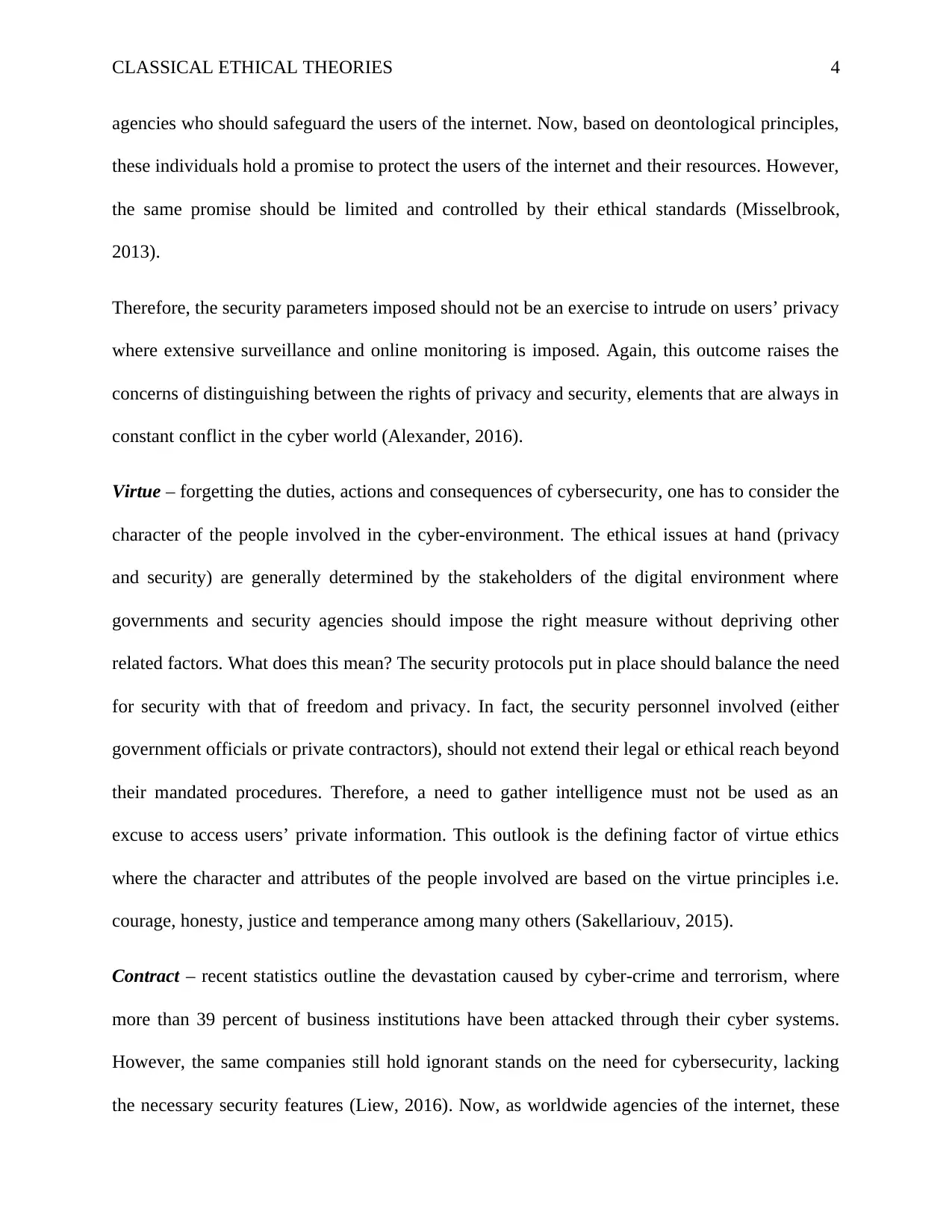
CLASSICAL ETHICAL THEORIES 4
agencies who should safeguard the users of the internet. Now, based on deontological principles,
these individuals hold a promise to protect the users of the internet and their resources. However,
the same promise should be limited and controlled by their ethical standards (Misselbrook,
2013).
Therefore, the security parameters imposed should not be an exercise to intrude on users’ privacy
where extensive surveillance and online monitoring is imposed. Again, this outcome raises the
concerns of distinguishing between the rights of privacy and security, elements that are always in
constant conflict in the cyber world (Alexander, 2016).
Virtue – forgetting the duties, actions and consequences of cybersecurity, one has to consider the
character of the people involved in the cyber-environment. The ethical issues at hand (privacy
and security) are generally determined by the stakeholders of the digital environment where
governments and security agencies should impose the right measure without depriving other
related factors. What does this mean? The security protocols put in place should balance the need
for security with that of freedom and privacy. In fact, the security personnel involved (either
government officials or private contractors), should not extend their legal or ethical reach beyond
their mandated procedures. Therefore, a need to gather intelligence must not be used as an
excuse to access users’ private information. This outlook is the defining factor of virtue ethics
where the character and attributes of the people involved are based on the virtue principles i.e.
courage, honesty, justice and temperance among many others (Sakellariouv, 2015).
Contract – recent statistics outline the devastation caused by cyber-crime and terrorism, where
more than 39 percent of business institutions have been attacked through their cyber systems.
However, the same companies still hold ignorant stands on the need for cybersecurity, lacking
the necessary security features (Liew, 2016). Now, as worldwide agencies of the internet, these
agencies who should safeguard the users of the internet. Now, based on deontological principles,
these individuals hold a promise to protect the users of the internet and their resources. However,
the same promise should be limited and controlled by their ethical standards (Misselbrook,
2013).
Therefore, the security parameters imposed should not be an exercise to intrude on users’ privacy
where extensive surveillance and online monitoring is imposed. Again, this outcome raises the
concerns of distinguishing between the rights of privacy and security, elements that are always in
constant conflict in the cyber world (Alexander, 2016).
Virtue – forgetting the duties, actions and consequences of cybersecurity, one has to consider the
character of the people involved in the cyber-environment. The ethical issues at hand (privacy
and security) are generally determined by the stakeholders of the digital environment where
governments and security agencies should impose the right measure without depriving other
related factors. What does this mean? The security protocols put in place should balance the need
for security with that of freedom and privacy. In fact, the security personnel involved (either
government officials or private contractors), should not extend their legal or ethical reach beyond
their mandated procedures. Therefore, a need to gather intelligence must not be used as an
excuse to access users’ private information. This outlook is the defining factor of virtue ethics
where the character and attributes of the people involved are based on the virtue principles i.e.
courage, honesty, justice and temperance among many others (Sakellariouv, 2015).
Contract – recent statistics outline the devastation caused by cyber-crime and terrorism, where
more than 39 percent of business institutions have been attacked through their cyber systems.
However, the same companies still hold ignorant stands on the need for cybersecurity, lacking
the necessary security features (Liew, 2016). Now, as worldwide agencies of the internet, these
Paraphrase This Document
Need a fresh take? Get an instant paraphrase of this document with our AI Paraphraser
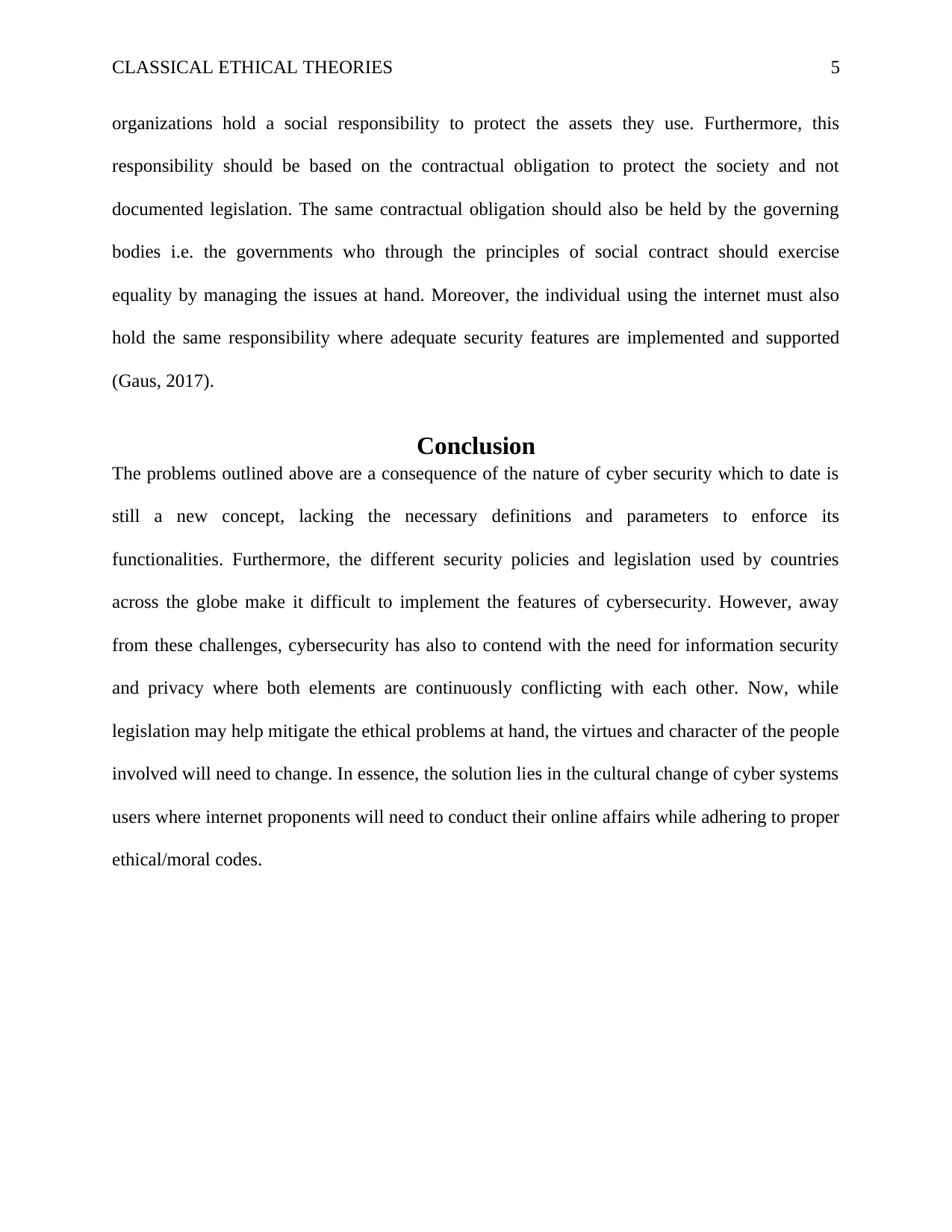
CLASSICAL ETHICAL THEORIES 5
organizations hold a social responsibility to protect the assets they use. Furthermore, this
responsibility should be based on the contractual obligation to protect the society and not
documented legislation. The same contractual obligation should also be held by the governing
bodies i.e. the governments who through the principles of social contract should exercise
equality by managing the issues at hand. Moreover, the individual using the internet must also
hold the same responsibility where adequate security features are implemented and supported
(Gaus, 2017).
Conclusion
The problems outlined above are a consequence of the nature of cyber security which to date is
still a new concept, lacking the necessary definitions and parameters to enforce its
functionalities. Furthermore, the different security policies and legislation used by countries
across the globe make it difficult to implement the features of cybersecurity. However, away
from these challenges, cybersecurity has also to contend with the need for information security
and privacy where both elements are continuously conflicting with each other. Now, while
legislation may help mitigate the ethical problems at hand, the virtues and character of the people
involved will need to change. In essence, the solution lies in the cultural change of cyber systems
users where internet proponents will need to conduct their online affairs while adhering to proper
ethical/moral codes.
organizations hold a social responsibility to protect the assets they use. Furthermore, this
responsibility should be based on the contractual obligation to protect the society and not
documented legislation. The same contractual obligation should also be held by the governing
bodies i.e. the governments who through the principles of social contract should exercise
equality by managing the issues at hand. Moreover, the individual using the internet must also
hold the same responsibility where adequate security features are implemented and supported
(Gaus, 2017).
Conclusion
The problems outlined above are a consequence of the nature of cyber security which to date is
still a new concept, lacking the necessary definitions and parameters to enforce its
functionalities. Furthermore, the different security policies and legislation used by countries
across the globe make it difficult to implement the features of cybersecurity. However, away
from these challenges, cybersecurity has also to contend with the need for information security
and privacy where both elements are continuously conflicting with each other. Now, while
legislation may help mitigate the ethical problems at hand, the virtues and character of the people
involved will need to change. In essence, the solution lies in the cultural change of cyber systems
users where internet proponents will need to conduct their online affairs while adhering to proper
ethical/moral codes.
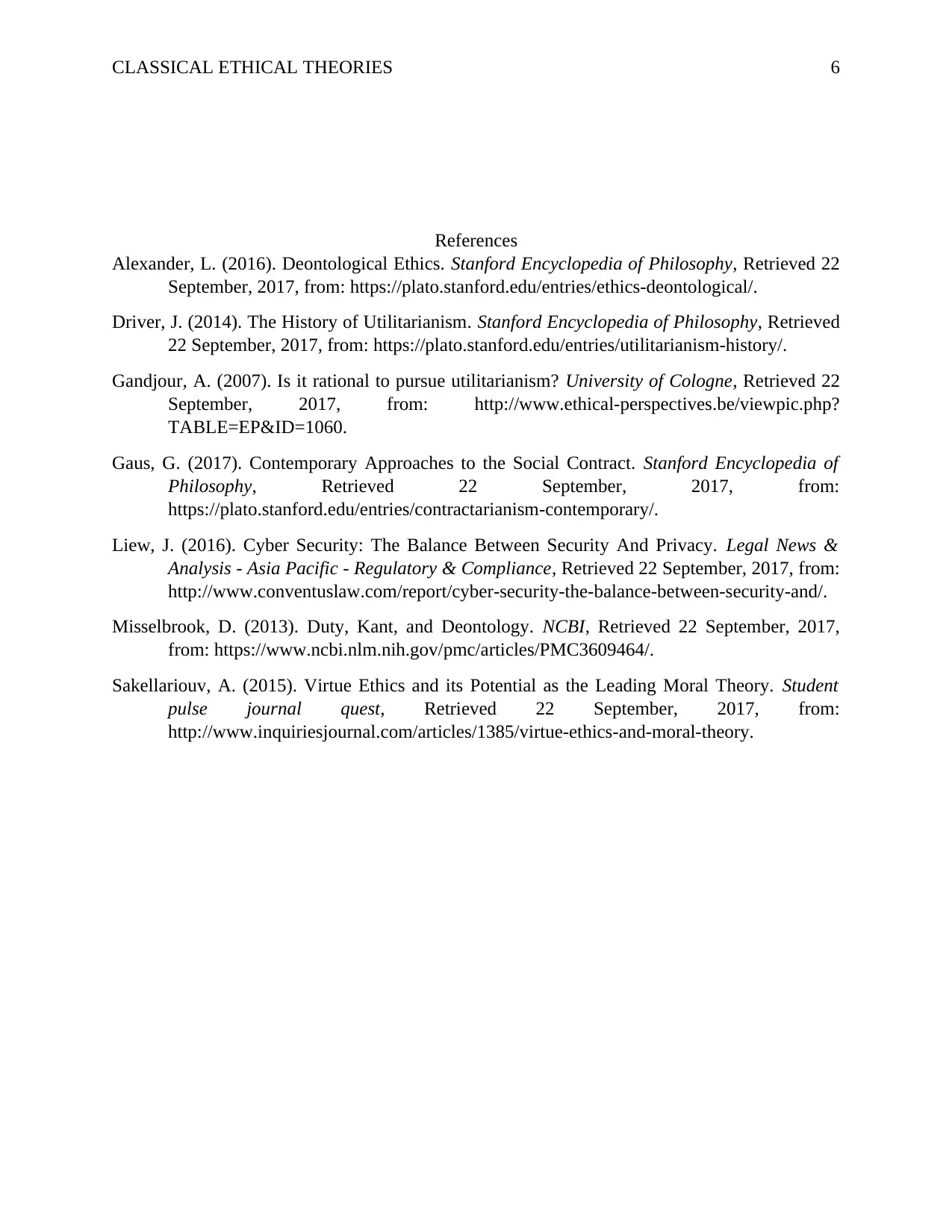
CLASSICAL ETHICAL THEORIES 6
References
Alexander, L. (2016). Deontological Ethics. Stanford Encyclopedia of Philosophy, Retrieved 22
September, 2017, from: https://plato.stanford.edu/entries/ethics-deontological/.
Driver, J. (2014). The History of Utilitarianism. Stanford Encyclopedia of Philosophy, Retrieved
22 September, 2017, from: https://plato.stanford.edu/entries/utilitarianism-history/.
Gandjour, A. (2007). Is it rational to pursue utilitarianism? University of Cologne, Retrieved 22
September, 2017, from: http://www.ethical-perspectives.be/viewpic.php?
TABLE=EP&ID=1060.
Gaus, G. (2017). Contemporary Approaches to the Social Contract. Stanford Encyclopedia of
Philosophy, Retrieved 22 September, 2017, from:
https://plato.stanford.edu/entries/contractarianism-contemporary/.
Liew, J. (2016). Cyber Security: The Balance Between Security And Privacy. Legal News &
Analysis - Asia Pacific - Regulatory & Compliance, Retrieved 22 September, 2017, from:
http://www.conventuslaw.com/report/cyber-security-the-balance-between-security-and/.
Misselbrook, D. (2013). Duty, Kant, and Deontology. NCBI, Retrieved 22 September, 2017,
from: https://www.ncbi.nlm.nih.gov/pmc/articles/PMC3609464/.
Sakellariouv, A. (2015). Virtue Ethics and its Potential as the Leading Moral Theory. Student
pulse journal quest, Retrieved 22 September, 2017, from:
http://www.inquiriesjournal.com/articles/1385/virtue-ethics-and-moral-theory.
References
Alexander, L. (2016). Deontological Ethics. Stanford Encyclopedia of Philosophy, Retrieved 22
September, 2017, from: https://plato.stanford.edu/entries/ethics-deontological/.
Driver, J. (2014). The History of Utilitarianism. Stanford Encyclopedia of Philosophy, Retrieved
22 September, 2017, from: https://plato.stanford.edu/entries/utilitarianism-history/.
Gandjour, A. (2007). Is it rational to pursue utilitarianism? University of Cologne, Retrieved 22
September, 2017, from: http://www.ethical-perspectives.be/viewpic.php?
TABLE=EP&ID=1060.
Gaus, G. (2017). Contemporary Approaches to the Social Contract. Stanford Encyclopedia of
Philosophy, Retrieved 22 September, 2017, from:
https://plato.stanford.edu/entries/contractarianism-contemporary/.
Liew, J. (2016). Cyber Security: The Balance Between Security And Privacy. Legal News &
Analysis - Asia Pacific - Regulatory & Compliance, Retrieved 22 September, 2017, from:
http://www.conventuslaw.com/report/cyber-security-the-balance-between-security-and/.
Misselbrook, D. (2013). Duty, Kant, and Deontology. NCBI, Retrieved 22 September, 2017,
from: https://www.ncbi.nlm.nih.gov/pmc/articles/PMC3609464/.
Sakellariouv, A. (2015). Virtue Ethics and its Potential as the Leading Moral Theory. Student
pulse journal quest, Retrieved 22 September, 2017, from:
http://www.inquiriesjournal.com/articles/1385/virtue-ethics-and-moral-theory.
⊘ This is a preview!⊘
Do you want full access?
Subscribe today to unlock all pages.

Trusted by 1+ million students worldwide
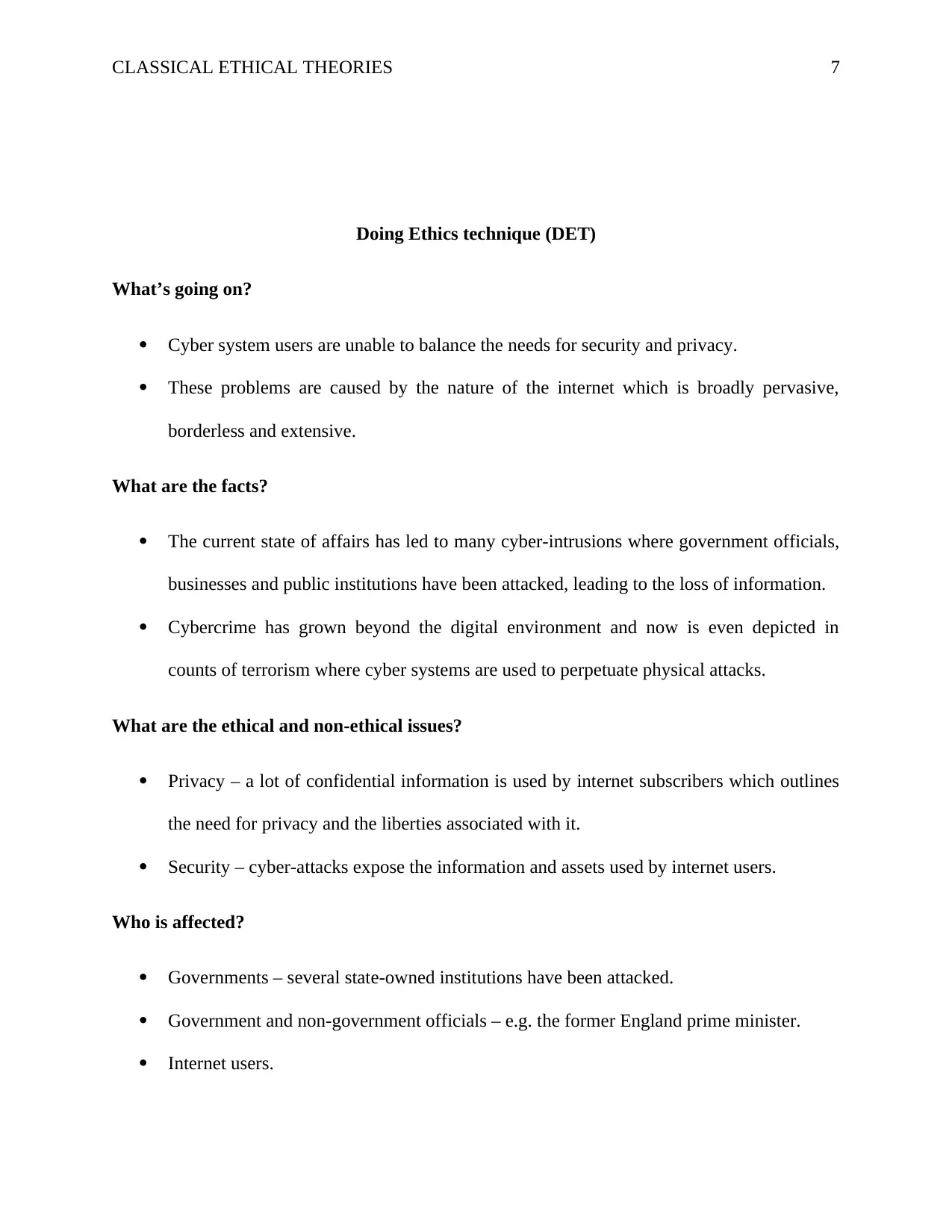
CLASSICAL ETHICAL THEORIES 7
Doing Ethics technique (DET)
What’s going on?
Cyber system users are unable to balance the needs for security and privacy.
These problems are caused by the nature of the internet which is broadly pervasive,
borderless and extensive.
What are the facts?
The current state of affairs has led to many cyber-intrusions where government officials,
businesses and public institutions have been attacked, leading to the loss of information.
Cybercrime has grown beyond the digital environment and now is even depicted in
counts of terrorism where cyber systems are used to perpetuate physical attacks.
What are the ethical and non-ethical issues?
Privacy – a lot of confidential information is used by internet subscribers which outlines
the need for privacy and the liberties associated with it.
Security – cyber-attacks expose the information and assets used by internet users.
Who is affected?
Governments – several state-owned institutions have been attacked.
Government and non-government officials – e.g. the former England prime minister.
Internet users.
Doing Ethics technique (DET)
What’s going on?
Cyber system users are unable to balance the needs for security and privacy.
These problems are caused by the nature of the internet which is broadly pervasive,
borderless and extensive.
What are the facts?
The current state of affairs has led to many cyber-intrusions where government officials,
businesses and public institutions have been attacked, leading to the loss of information.
Cybercrime has grown beyond the digital environment and now is even depicted in
counts of terrorism where cyber systems are used to perpetuate physical attacks.
What are the ethical and non-ethical issues?
Privacy – a lot of confidential information is used by internet subscribers which outlines
the need for privacy and the liberties associated with it.
Security – cyber-attacks expose the information and assets used by internet users.
Who is affected?
Governments – several state-owned institutions have been attacked.
Government and non-government officials – e.g. the former England prime minister.
Internet users.
Paraphrase This Document
Need a fresh take? Get an instant paraphrase of this document with our AI Paraphraser
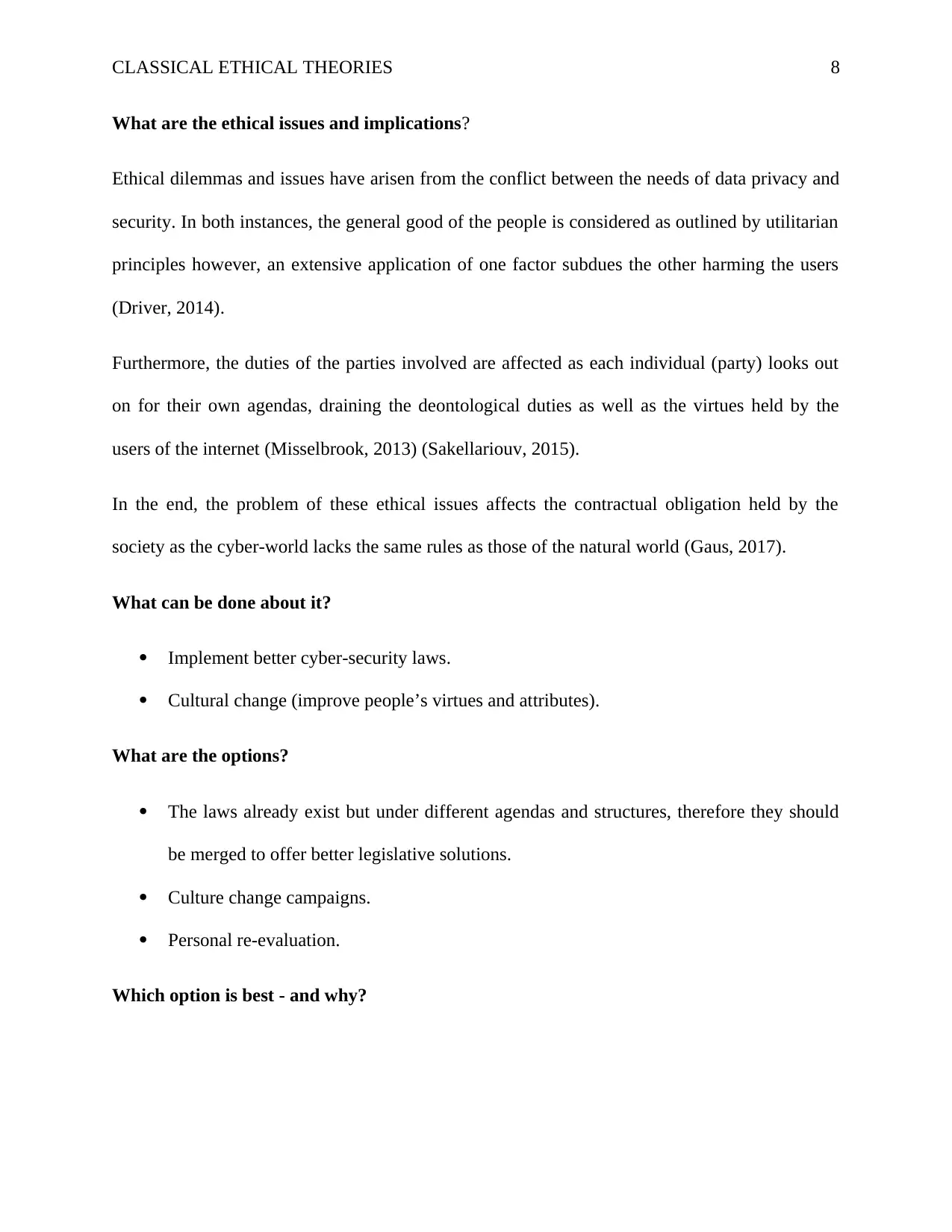
CLASSICAL ETHICAL THEORIES 8
What are the ethical issues and implications?
Ethical dilemmas and issues have arisen from the conflict between the needs of data privacy and
security. In both instances, the general good of the people is considered as outlined by utilitarian
principles however, an extensive application of one factor subdues the other harming the users
(Driver, 2014).
Furthermore, the duties of the parties involved are affected as each individual (party) looks out
on for their own agendas, draining the deontological duties as well as the virtues held by the
users of the internet (Misselbrook, 2013) (Sakellariouv, 2015).
In the end, the problem of these ethical issues affects the contractual obligation held by the
society as the cyber-world lacks the same rules as those of the natural world (Gaus, 2017).
What can be done about it?
Implement better cyber-security laws.
Cultural change (improve people’s virtues and attributes).
What are the options?
The laws already exist but under different agendas and structures, therefore they should
be merged to offer better legislative solutions.
Culture change campaigns.
Personal re-evaluation.
Which option is best - and why?
What are the ethical issues and implications?
Ethical dilemmas and issues have arisen from the conflict between the needs of data privacy and
security. In both instances, the general good of the people is considered as outlined by utilitarian
principles however, an extensive application of one factor subdues the other harming the users
(Driver, 2014).
Furthermore, the duties of the parties involved are affected as each individual (party) looks out
on for their own agendas, draining the deontological duties as well as the virtues held by the
users of the internet (Misselbrook, 2013) (Sakellariouv, 2015).
In the end, the problem of these ethical issues affects the contractual obligation held by the
society as the cyber-world lacks the same rules as those of the natural world (Gaus, 2017).
What can be done about it?
Implement better cyber-security laws.
Cultural change (improve people’s virtues and attributes).
What are the options?
The laws already exist but under different agendas and structures, therefore they should
be merged to offer better legislative solutions.
Culture change campaigns.
Personal re-evaluation.
Which option is best - and why?
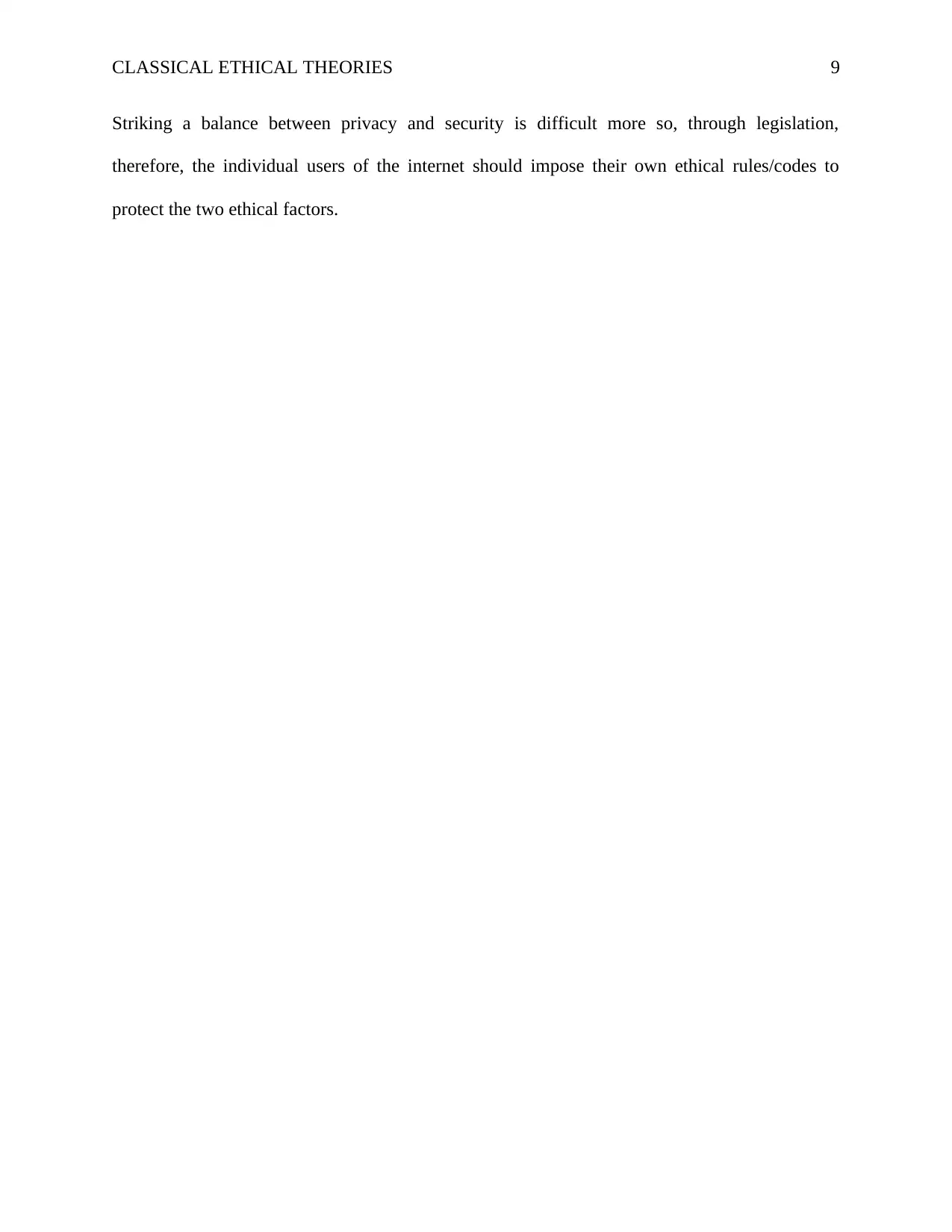
CLASSICAL ETHICAL THEORIES 9
Striking a balance between privacy and security is difficult more so, through legislation,
therefore, the individual users of the internet should impose their own ethical rules/codes to
protect the two ethical factors.
Striking a balance between privacy and security is difficult more so, through legislation,
therefore, the individual users of the internet should impose their own ethical rules/codes to
protect the two ethical factors.
⊘ This is a preview!⊘
Do you want full access?
Subscribe today to unlock all pages.

Trusted by 1+ million students worldwide
1 out of 9
Your All-in-One AI-Powered Toolkit for Academic Success.
+13062052269
info@desklib.com
Available 24*7 on WhatsApp / Email
![[object Object]](/_next/static/media/star-bottom.7253800d.svg)
Unlock your academic potential
Copyright © 2020–2026 A2Z Services. All Rights Reserved. Developed and managed by ZUCOL.


